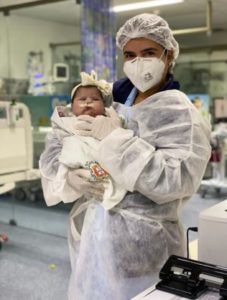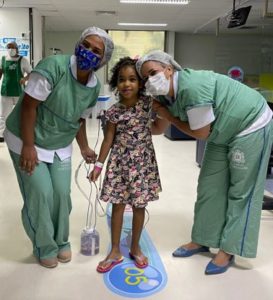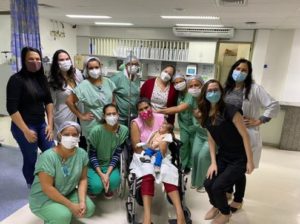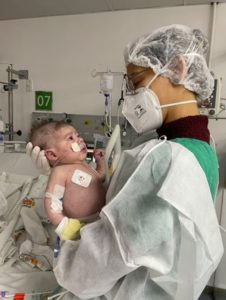Published November 10, 2022
One of the largest hospitals in the populous northeast region of Brazil, Real Hospital Português in Recife, joins Children’s HeartLink as our fourth partner in the country. The team will train with Children’s HeartLink new medical volunteers from Texas Children’s Hospital. With a waiting list for cardiac surgery, Real Hospital Português hopes that this long-term partnership will help them serve more children with heart disease.

“It’s a great opportunity and honor for us to partner with Children’s HeartLink and Texas Children’s Hospital,” says pediatric cardiologist Dr. Juliana Neves. She has been working at Real Hospital Português during her entire 22-year career. “We are not a small institution, but we have room to grow when it comes to learning how to work as a team. If we can be more efficient, we can grow and serve more children in the northeast of Brazil. It’s a poor region, and we need to help more children to have heart surgery and be well.”
Real Hospital Português is a private not-for-profit 850-bed hospital that serves the northeast region of Brazil with a population of 57 million people. The pediatric cardiac unit performs approximately 200 surgeries a year, and the need for cardiac heart surgery is still high.
Long-term partnership
Children’s HeartLink invests in long-term partnerships to build centers of excellence in pediatric cardiac care. Our approach is to strengthen pediatric cardiac programs in underserved regions by increasing their clinical capacity to treat more children, advancing diagnostics and surgical techniques, and decreasing postoperative infections and mortality. Real Hospital Português becomes the 19th Children’s HeartLink partner hospital in low- and middle-income countries that include Brazil, China, India, Malaysia and Vietnam.

“This new partnership is another step towards our aspirational goal to reach one million more children in underserved regions by 2030,” says Children’s HeartLink President Jackie Boucher. “We choose new partners based on certain criteria including a strong pediatric cardiac program, surgical volume and mainly, commitment to grow and become a regional trainer upon completion of its own training. We are excited that Real Hospital Português joins our global partner community, and we are looking forward to long-lasting collaboration and friendship. We are also thankful to Medtronic Foundation for their grant that makes this new partnership possible.”
In 2021, Medtronic Foundation made a three-year commitment aimed at training 10,000 health workers and providing surgery and quality outcomes for 10,000 children born with congenital heart disease.
Dr. Neves says that her team hopes this partnership helps them achieve better outcomes in surgery and reduce patient stay time in the ICU—so that more children could be operated on. Also, the hospital intends to work on improving the referral network in the region—so patients receive timely and appropriate care.
Inspired by the results of colleagues
Dr. Neves adds that she learned about Children’s HeartLink from her colleagues at Hospital da Criança e Maternidade. This hospital in São José do Rio Preto is a Children’s HeartLink partner since 2009 and became a Children’s HeartLink Center of Excellence in 2021.

“Their results are really amazing,” shares Dr. Neves. “I went to Hospital da Criança e Maternidade before their partnership with Children’s HeartLink and then a few years after. The hospital was totally different. In 2021, I went there again, and I was impressed even more. Even the mindset of the people who are working there has changed. They know how to work together while helping children. Now, we want to do our best to improve our results.”
 Congenital heart disease in Brazil is the birth defect causing the highest mortality during the first year of life and the second leading cause of death during the first 30 days of life. There has been a gradual improvement in diagnosis and treatment in the country. Yet, there is still large disparities in care in different regions of Brazil and a great need for trained professionals. Currently, Children’s HeartLink is partnering with three hospitals in Brazil: Children’s HeartLink Center of Excellence Hospital da Criança e Maternidade (São José do Rio Preto), Instituto do Coração (São Paulo) and Hospital de Messejana (Fortaleza).
Congenital heart disease in Brazil is the birth defect causing the highest mortality during the first year of life and the second leading cause of death during the first 30 days of life. There has been a gradual improvement in diagnosis and treatment in the country. Yet, there is still large disparities in care in different regions of Brazil and a great need for trained professionals. Currently, Children’s HeartLink is partnering with three hospitals in Brazil: Children’s HeartLink Center of Excellence Hospital da Criança e Maternidade (São José do Rio Preto), Instituto do Coração (São Paulo) and Hospital de Messejana (Fortaleza).
Read our September 2022 blog announcement about our new medical volunteers from Texas Children’s.

